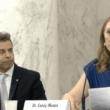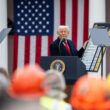This deal puts the nuclear genie back in the bottle
July 15, 2015
The preliminary accord that six world powers and Iran reached earlier this year outlined the parameters of a deal that would curtail Iran’s nuclear program; it was one of the most comprehensive and detailed nuclear arms agreements ever reached. If anything, the deal finalized this week in Vienna is even more restrictive. However, this has not satisfied the hardline critics of the deal in either Iran or the United States, many of whom appear to have criticized it even before reading it. A good look at the three main legs of the agreement shows that this deal is, in fact, a good one, for the United States and for the international community.
First of all, it precludes Iranian development of a nuclear weapon by shutting down all of the pathways Iran might use to accumulate enough nuclear material to make a weapon. It does this by limiting the amount of fuel that Iran can keep for the next 15 years, by cutting its current stockpile of low-enriched uranium by 98 percent, by reducing the number of centrifuges by two-thirds, by and modifying the core of its heavy-water reactor at Arak.
Moreover, Iran will still be subject to the constraints of the Nuclear Non-proliferation Treaty (NPT), which precludes it from developing nuclear weapons. It was Iran’s violations of the NPT that provided the legal underpinnings and international consensus for the current sanctions regime. Despite real tensions between some of the P5+1 countries, non-proliferation is an area of rare international consensus. If Iran attempts to develop nuclear weapons after the deal has run out, it could once again face devastating international sanctions.
Second, the deal places International Atomic Energy Agency (IAEA) monitoring and verification in place to ensure that Iran doesn’t cheat. While the inspections allowed in the agreement may not be anytime, anywhere inspections, they are pretty close. The inspectors will have 24/7 access to Iran’s nuclear facilities at Nantaz and Fordow and its entire nuclear supply chain, including its uranium mines and mills, its conversion facility for producing uranium hexafluoride, the feedstock for uranium enrichment, and its manufacturing and storage facilities for the centrifuges that have been involved with Iran's enrichment program. With electronic sensors and continuous monitoring of seals on the centrifuges, the IAEA will know instantly if Iran has tampered with them. The deal also allows the IAEA to enter a suspect facility within 24 days of suspicions being reported. In other words, the agreement calls for as-needed, where-needed access—and failure to grant it will be considered a violation that could lead to renewed sanctions. And Iran has agreed to the IAEA’s Additional Protocol, which allows monitoring and inspections of declared or undeclared sites in perpetuity.
Third, sanctions will not be lifted immediately, but will be phased out as Iran meets it commitments. The nuclear-related sanctions will be lifted only after the IAEA verifies that Iran is in compliance with the deal. The UN Security Council will reinstate certain other sanctions for specified periods of time: The sanctions related to sensitive nuclear equipment will be reimposed for 10 years, missile technology for eight years, and conventional arms for five years. Finally, the agreement contains a simple mechanism for snapping-back sanctions if Iran cheats—one that even Iran, Russia, and China acting in concert could not derail—and does not eliminate sanctions related to Iran’s support for terrorist groups.
Is the deal perfect? Of course not. Does Iran get some benefit? Of course. That is what negotiations are all about. But on balance, the United States and the world have gained much more. Not only will Iran’s nuclear program be curtailed, but the nonproliferation commitments of the Nuclear Non-proliferation Treaty regime will be rejuvenated, Iranian energy supplies will return to the world market, and there is a probability that Iran will become a more responsible member of the international community. With a strong IAEA verification regime in place and long-term monitoring to make sure Iran does not re-start a nuclear weapons program, this is a great deal for the international community.
Lawrence Korb and Katherine Blakeley
senior fellow and policy analyst (respectively)
Center for American Progress













